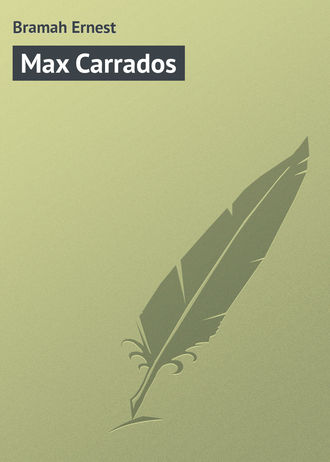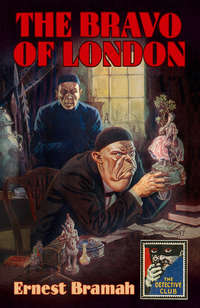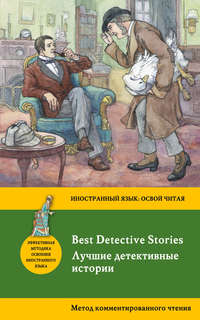 полная версия
полная версияMax Carrados
“I suppose not,” she replied. “I never thought. I know that when I came to leave the theatre one had vanished and Teddy had it here.”
“That was the first time you missed it?”
“Yes.”
“But it might have gone earlier in the evening – mislaid or lost or stolen?”
“I remember taking them off in the box. I sat in the corner farthest from the stage – the front row, of course – and I placed them on the support.”
“Where anyone in the next box could abstract one without much difficulty at a favourable moment.”
“That is quite likely. But we didn’t see anyone in the next box.”
“I have half an idea that I caught sight of someone hanging back,” volunteered Straithwaite.
“Thank you,” said Carrados, turning towards him almost gratefully. “That is most important – that you think you saw someone hanging back. Now the other glove, Mrs Straithwaite; what became of that?”
“An odd glove is not very much good, is it?” said Stephanie. “Certainly I wore it coming back. I think I threw it down somewhere in here. Probably it is still about. We are in a frantic muddle and nothing is being done.”
The second glove was found on the floor in a corner. Carrados received it and laid it with the other.
“You use a very faint and characteristic scent, I notice, Mrs Straithwaite,” he observed.
“Yes; it is rather sweet, isn’t it? I don’t know the name because it is in Russian. A friend in the Embassy sent me some bottles from Petersburg.”
“But on Tuesday you supplemented it with something stronger,” he continued, raising the gloves delicately one after the other to his face.
“Oh, eucalyptus; rather,” she admitted. “I simply drenched my handkerchief with it.”
“You have other gloves of the same pattern?”
“Have I? Now let me think! Did you give them to me, Teddy?”
“No,” replied Straithwaite from the other end of the room. He had lounged across to the window and his attitude detached him from the discussion. “Didn’t Whitstable?” he added shortly.
“Of course. Then there are three pairs, Mr Carrados, because I never let Bimbi lose more than that to me at once, poor boy.”
“I think you are rather tiring yourself out, Stephanie,” warned her husband.
Carrados’s attention seemed to leap to the voice; then he turned courteously to his hostess.
“I appreciate that you have had a trying time lately, Mrs Straithwaite,” he said. “Every moment I have been hoping to let you out of the witness-box – ”
“Perhaps to-morrow – ” began Straithwaite, recrossing the room.
“Impossible; I leave town to-night,” replied Carrados firmly. “You have three pairs of these gloves, Mrs Straithwaite. Here is one. The other two – ?”
“One pair I have not worn yet. The other – good gracious, I haven’t been out since Tuesday! I suppose it is in my glove-box.”
“I must see it, please.”
Straithwaite opened his mouth, but as his wife obediently rose to her feet to comply he turned sharply away with the word unspoken.
“These are they,” she said, returning.
“Mr Carrados and I will finish our investigation in my room,” interposed Straithwaite, with quiet assertiveness. “I should advise you to lie down for half-an-hour, Stephanie, if you don’t want to be a nervous wreck to-morrow.”
“You must allow the culprit to endorse that good advice, Mrs Straithwaite,” added Carrados. He had been examining the second pair of gloves as they spoke and he now handed them back again. “They are undoubtedly of the same set,” he admitted, with extinguished interest, “and so our clue runs out.”
“I hope you don’t mind,” apologized Straithwaite, as he led his guest to his own smoking-room. “Stephanie,” he confided, becoming more cordial as two doors separated them from the lady, “is a creature of nerves and indiscretions. She forgets. To-night she will not sleep. To-morrow she will suffer.” Carrados divined the grin. “So shall I!”
“On the contrary, pray accept my regrets,” said the visitor. “Besides,” he continued, “there is nothing more for me to do here, I suppose…”
“It is a mystery,” admitted Straithwaite, with polite agreement. “Will you try a cigarette?”
“Thanks. Can you see if my car is below?” They exchanged cigarettes and stood at the window lighting them.
“There is one point, by the way, that may have some significance.” Carrados had begun to recross the room and stopped to pick up the two fictitious messages. “You will have noticed that this is the outside sheet of a programme. It is not the most suitable for the purpose; the first inner sheet is more convenient to write on, but there the date appears. You see the inference? The programme was obtained before – ”
“Perhaps. Well – ?” for Carrados had broken off abruptly and was listening.
“You hear someone coming up the steps?”
“It is the general stairway.”
“Mr Straithwaite, I don’t know how far this has gone in other quarters. We may only have a few seconds before we are interrupted.”
“What do you mean?”
“I mean that the man who is now on the stairs is a policeman or has worn the uniform. If he stops at your door – ”
The heavy tread ceased. Then came the authoritative knock.
“Wait,” muttered Carrados, laying his hand impressively on Straithwaite’s tremulous arm. “I may recognize the voice.”
They heard the servant pass along the hall and the door unlatched; then caught the jumble of a gruff inquiry.
“Inspector Beedel of Scotland Yard!” The servant repassed their door on her way to the drawing-room. “It is no good disguising the fact from you, Mr Straithwaite, that you may no longer be at liberty. But I am. Is there anything you wish done?”
There was no time for deliberation. Straithwaite was indeed between the unenviable alternatives of the familiar proverb, but, to do him justice, his voice had lost scarcely a ripple of its usual sang-froid.
“Thanks,” he replied, taking a small stamped and addressed parcel from his pocket, “you might drop this into some obscure pillar-box, if you will.”
“The Markham necklace?”
“Exactly. I was going out to post it when you came.”
“I am sure you were.”
“And if you could spare five minutes later – if I am here – ”
Carrados slid his cigarette-case under some papers on the desk.
“I will call for that,” he assented. “Let us say about half-past eight.”
“I am still at large, you see, Mr Carrados; though after reflecting on the studied formality of the inspector’s business here, I imagine that you will scarcely be surprised.”
“I have made it a habit,” admitted Carrados, “never to be surprised.”
“However, I still want to cut a rather different figure in your eyes. You regard me, Mr Carrados, either as a detected rogue or a repentant ass?”
“Another excellent rule is never to form deductions from uncertainties.”
Straithwaite made a gesture of mild impatience.
“You only give me ten minutes. If I am to put my case before you, Mr Carrados, we cannot fence with phrases… To-day you have had an exceptional opportunity of penetrating into our mode of life. You will, I do not doubt, have summed up our perpetual indebtedness and the easy credit that our connexion procures; Stephanie’s social ambitions and expensive popularity; her utterly extravagant incapacity to see any other possible existence; and my tacit acquiescence. You will, I know, have correctly gauged her irresponsible, neurotic temperament, and judged the result of it in conflict with my own. What possibly has escaped you, for in society one has to disguise these things, is that I still love my wife.
“When you dare not trust the soundness of your reins you do not try to pull up a bolting horse. For three years I have endeavoured to guide Stephanie round awkward comers with as little visible restraint as possible. When we differ over any project upon which she has set her heart Stephanie has one strong argument.”
“That you no longer love her?”
“Well, perhaps; but more forcibly expressed. She rushes to the top of the building – there are six floors, Mr Carrados, and we are on the second – and climbing on to the banister she announces her intention of throwing herself down into the basement. In the meanwhile I have followed her and drag her back again. One day I shall stay where I am and let her do as she intends.”
“I hope not,” said Carrados gravely.
“Oh, don’t be concerned. She will then climb back herself. But it will mark an epoch. It was by that threat that she obtained my acquiescence to this scheme – that and the certainty that she would otherwise go on without me. But I had no intention of allowing her to land herself – to say nothing of us both – behind the bars of a prison if I could help it. And, above all, I wished to cure her of her fatuous delusion that she is clever, in the hope that she may then give up being foolish.
“To fail her on the occasion was merely to postpone the attempt. I conceived the idea of seeming to cooperate and at the same time involving us in what appeared to be a clever counter-fraud. The thought of the real loss will perhaps have a good effect; the publicity will certainly prevent her from daring a second ‘theft.’ A sordid story, Mr Carrados,” he concluded. “Do not forget your cigarette-case in reality.”
The paternal shake of Carrados’s head over the recital was neutralized by his benevolent smile.
“Yes, yes,” he said. “I think we can classify you, Mr Straithwaite. One point – the glove?”
“That was an afterthought. I had arranged the whole story and the first note was to be brought to me by an attendant. Then, on my way, in my overcoat pocket I discovered a pair of Stephanie’s gloves which she had asked me to carry the day before. The suggestion flashed – how much more convincing if I could arrange for her to seem to drop the writing in that way. As she said, the next box was empty; I merely took possession of it for a few minutes and quietly drew across one of her gloves. And that reminds me – of course there was nothing in it, but your interest in them made me rather nervous.”
Carrados laughed outright. Then he stood up and held out his hand.
“Good-night, Mr Straithwaite,” he said, with real friendliness. “Let me give you the quaker’s advice: Don’t attempt another conspiracy – but if you do, don’t produce a ‘pair’ of gloves of which one is still suggestive of scent, and the other identifiable with eucalyptus!”
“Oh – !” said Straithwaite.
“Quite so. But at all hazard suppress a second pair that has the same peculiarity. Think over what it must mean. Good-bye.”
Twelve minutes later Mr Carlyle was called to the telephone.
“It is eight-fifty-five and I am at Charing Cross,” said a voice he knew. “If you want local colour contrive an excuse to be with Markham when the first post arrives to-morrow.” A few more words followed, and an affectionate valediction.
“One moment, my dear Max, one moment. Do I understand you to say that you will post me on the report of the case from Dover?”
“No, Louis,” replied Carrados, with cryptic discrimination. “I only said that I will post you on a report of the case from Dover.”
THE LAST EXPLOIT OF HARRY THE ACTOR
The one insignificant fact upon which turned the following incident in the joint experiences of Mr Carlyle and Max Carrados was merely this: that having called upon his friend just at the moment when the private detective was on the point of leaving his office to go to the safe deposit in Lucas Street, Piccadilly, the blind amateur accompanied him, and for ten minutes amused himself by sitting quite quietly among the palms in the centre of the circular hall while Mr Carlyle was occupied with his deed-box in one of the little compartments provided for the purpose.
The Lucas Street depository was then (it has since been converted into a picture palace) generally accepted as being one of the strongest places in London. The front of the building was constructed to represent a gigantic safe door, and under the colloquial designation of “The Safe” the place had passed into a synonym for all that was secure and impregnable. Half of the marketable securities in the west of London were popularly reported to have seen the inside of its coffers at one time or another, together with the same generous proportion of family jewels. However exaggerated an estimate this might be, the substratum of truth was solid and auriferous enough to dazzle the imagination. When ordinary safes were being carried bodily away with impunity or ingeniously fused open by the scientifically equipped cracksman, nervous bond-holders turned with relief to the attractions of an establishment whose modest claim was summed up in its telegraphic address: “Impregnable.” To it went also the jewel-case between the lady’s social engagements, and when in due course “the family” journeyed north – or south, east or west – whenever, in short, the London house was closed, its capacious storerooms received the plate-chest as an established custom. Not a few traders also – jewellers, financiers, dealers in pictures, antiques and costly bijouterie, for instance – constantly used its facilities for any stock that they did not requite immediately to hand.
There was only one entrance to the place, an exaggerated keyhole, to carry out the similitude of the safe-door alluded to. The ground floor was occupied by the ordinary offices of the company; all the strong-rooms and safes lay in the steel-cased basement. This was reached both by a lift and by a flight of steps. In either case the visitor found before him a grille of massive proportions. Behind its bars stood a formidable commissionaire who never left his post, his sole duty being to open and close the grille to arriving and departing clients. Beyond this, a short passage led into the round central hall where Carrados was waiting. From this part, other passages radiated off to the vaults and strong-rooms, each one barred from the hall by a grille scarcely less ponderous than the first one. The doors of the various private rooms put at the disposal of the company’s clients, and that of the manager’s office, filled the wall-space between the radiating passages. Everything was very quiet, everything looked very bright, and everything seemed hopelessly impregnable.
“But I wonder?” ran Carrados’s dubious reflection; as he reached this point.
“Sorry to have kept you so long, my dear Max,” broke in Mr Carlyle’s crisp voice. He had emerged from his compartment and was crossing the hall, deed-box in hand. “Another minute and I will be with you.”
Carrados smiled and nodded and resumed his former expression, which was merely that of an uninterested gentleman waiting patiently for another. It is something of an attainment to watch closely without betraying undue curiosity, but others of the senses – hearing and smelling, for instance – can be keenly engaged while the observer possibly has the appearance of falling asleep.
“Now,” announced Mr Carlyle, returning briskly to his friend’s chair, and drawing on his grey suede gloves.
“You are in no particular hurry?”
“No,” admitted the professional man, with the slowness of mild surprise. “Not at all. What do you propose?”
“It is very pleasant here,” replied Carrados tranquilly. “Very cool and restful with this armoured steel between us and the dust and scurry of the hot July afternoon above. I propose remaining here for a few minutes longer.”
“Certainly,” agreed Mr Carlyle, taking the nearest chair and eyeing Carrados as though he had a shrewd suspicion of something more than met the ear. “I believe some very interesting people rent safes here. We may encounter a bishop, or a winning jockey, or even a musical comedy actress. Unfortunately it seems to be rather a slack time.”
“Two men came down while you were in your cubicle,” remarked Carrados casually. “The first took the lift. I imagine that he was a middle-aged, rather portly man. He carried a stick, wore a silk hat, and used spectacles for close sight. The other came by the stairway. I infer that he arrived at the top immediately after the lift had gone. He ran down the steps, so that the two were admitted at the same time, but the second man, though the more active of the pair, hung back for a moment in the passage and the portly one was the first to go to his safe.”
Mr Carlyle’s knowing look expressed: “Go on, my friend; you are coming to something.” But he merely contributed an encouraging “Yes?”
“When you emerged just now our second man quietly opened the door of his pen a fraction. Doubtless he looked out. Then he closed it as quietly again. You were not his man, Louis.”
“I am grateful,” said Mr Carlyle expressively. “What next, Louis?”
“That is all; they are still closeted.”
Both were silent for a moment. Mr Carlyle’s feeling was one of unconfessed perplexity. So far the incident was utterly trivial in his eyes; but he knew that the trifles which appeared significant to Max had a way of standing out like signposts when the time came to look back over an episode. Carrados’s sightless faculties seemed indeed to keep him just a move ahead as the game progressed.
“Is there really anything in it, Max?” he asked at length.
“Who can say?” replied Carrados. “At least we may wait to see them go. Those tin deed-boxes now. There is one to each safe, I think?”
“Yes, so I imagine. The practice is to carry the box to your private lair and there unlock it and do your business. Then you lock it up again and take it back to your safe.”
“Steady! our first man,” whispered Carrados hurriedly. “Here, look at this with me.” He opened a paper – a prospectus – which he pulled from his pocket, and they affected to study its contents together.
“You were about right, my friend,” muttered Mr Carlyle, pointing to a paragraph of assumed interest. “Hat, stick and spectacles. He is a clean-shaven, pink-faced old boy. I believe – yes, I know the man by sight. He is a bookmaker in a large way, I am told.”
“Here comes the other,” whispered Carrados.
The bookmaker passed across the hall, joined on his way by the manager whose duty it was to counterlock the safe, and disappeared along one of the passages. The second man sauntered up and down, waiting his turn. Mr Carlyle reported his movements in an undertone and described him. He was a younger man than the other, of medium height, and passably well dressed in a quiet lounge suit, green Alpine hat and brown shoes. By the time the detective had reached his wavy chestnut hair, large and rather ragged moustache, and sandy, freckled complexion, the first man had completed his business and was leaving the place.
“It isn’t an exchange lay, at all events,” said Mr Carlyle. “His inner case is only half the size of the other and couldn’t possibly be substituted.”
“Come up now,” said Carrados, rising. “There is nothing more to be learned down here.”
They requisitioned the lift and on the steps outside the gigantic keyhole stood for a few minutes discussing an investment as a couple of trustees or a lawyer and a client who were parting there might do. Fifty yards away, a very large silk hat with a very curly brim marked the progress of the bookmaker towards Piccadilly.
The lift in the hall behind them swirled up again and the gate clashed. The second man walked leisurely out and sauntered away without a backward glance.
“He has gone in the opposite direction,” exclaimed Mr Carlyle, rather blankly. “It isn’t the ‘lame goat’ nor the ‘follow-me-on,’ nor even the homely but efficacious sand-bag.”
“What colour were his eyes?” asked Carrados.
“Upon my word, I never noticed,” admitted the other.
“Parkinson would have noticed,” was the severe comment.
“I am not Parkinson,” retorted Mr Carlyle, with asperity, “and, strictly as one dear friend to another, Max, permit me to add, that while cherishing an unbounded admiration for your remarkable gifts, I have the strongest suspicion that the whole incident is a ridiculous mare’s nest, bred in the fantastic imagination of an enthusiastic criminologist.”
Mr Carrados received this outburst with the utmost benignity. “Come and have a coffee, Louis,” he suggested. “Mehmed’s is only a street away.”
Mehmed proved to be a cosmopolitan gentleman from Mocha whose shop resembled a house from the outside and an Oriental divan when one was within. A turbaned Arab placed cigarettes and cups of coffee spiced with saffron before the customers, gave salaam and withdrew.
“You know, my dear chap,” continued Mr Carlyle, sipping his black coffee and wondering privately whether it was really very good or very bad, “speaking quite seriously, the one fishy detail – our ginger friend’s watching for the other to leave – may be open to a dozen very innocent explanations.”
“So innocent that to-morrow I intend taking a safe myself.”
“You think that everything is all right?”
“On the contrary, I am convinced that something is very wrong.”
“Then why – ?”
“I shall keep nothing there, but it will give me the entrée. I should advise you, Louis, in the first place to empty your safe with all possible speed, and in the second to leave your business card on the manager.”
Mr Carlyle pushed his cup away, convinced now that the coffee was really very bad.
“But, my dear Max, the place – ‘The Safe’ – is impregnable!”
“When I was in the States, three years ago, the head porter at one hotel took pains to impress on me that the building was absolutely fireproof. I at once had my things taken off to another hotel. Two weeks later the first place was burnt out. It was fireproof, I believe, but of course the furniture and the fittings were not and the walls gave way.”
“Very ingenious,” admitted Mr Carlyle, “but why did you really go? You know you can’t humbug me with your superhuman sixth sense, my friend.”
Carrados smiled pleasantly, thereby encouraging the watchful attendant to draw near and replenish their tiny cups.
“Perhaps,” replied the blind man, “because so many careless people were satisfied that it was fireproof.”
“Ah-ha, there you are – the greater the confidence the greater the risk. But only if your self-confidence results in carelessness. Now do you know how this place is secured, Max?”
“I am told that they lock the door at night,” replied Carrados, with bland malice.
“And hide the key under the mat to be ready for the first arrival in the morning,” crowed Mr Carlyle, in the same playful spirit. “Dear old chap! Well, let me tell you – ”
“That force is out of the question. Quite so,” admitted his friend.
“That simplifies the argument. Let us consider fraud. There again the precautions are so rigid that many people pronounce the forms a nuisance. I confess that I do not. I regard them as a means of protecting my own property and I cheerfully sign my name and give my password, which the manager compares with his record-book before he releases the first lock of my safe. The signature is burned before my eyes in a sort of crucible there, the password is of my own choosing and is written only in a book that no one but the manager ever sees, and my key is the sole one in existence.”
“No duplicate or master-key?”
“Neither. If a key is lost it takes a skilful mechanic half-a-day to cut his way in. Then you must remember that clients of a safe-deposit are not multitudinous. All are known more or less by sight to the officials there, and a stranger would receive close attention. Now, Max, by what combination of circumstances is a rogue to know my password, to be able to forge my signature, to possess himself of my key, and to resemble me personally? And, finally, how is he possibly to determine beforehand whether there is anything in my safe to repay so elaborate a plant?” Mr Carlyle concluded in triumph and was so carried away by the strength of his position that he drank off the contents of his second cup before he realized what he was doing.
“At the hotel I just spoke of,” replied Carrados, “there was an attendant whose one duty in case of alarm was to secure three iron doors. On the night of the fire he had a bad attack of toothache and slipped away for just a quarter of an hour to have the thing out. There was a most up-to-date system of automatic fire alarm; it had been tested only the day before and the electrician, finding some part not absolutely to his satisfaction, had taken it away and not had time to replace it. The night watchman, it turned out, had received leave to present himself a couple of hours later on that particular night, and the hotel fireman, whose duties he took over, had missed being notified. Lastly, there was a big riverside blaze at the same time and all the engines were down at the other end of the city.”





